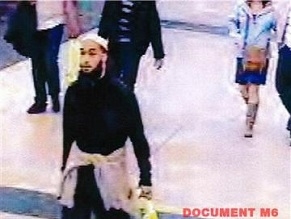|
World Jewish News

Muslim convert, identified only as Alexandre Dhaussy, is thought to have confessed to committing the attack.
|
French Muslim convert arrested for attack on soldier as Interior Minister insists ‘there are ways to combat’ individual jihadism
31.05.2013, Jews and Society A 22 year-old man was arrested in connection with an attack on a French soldier in Paris Wednesday.
According to sources close to the enquiry, the reported Muslim convert, identified only as Alexandre Dhaussy, who is thought to have confessed to committing the attack, is of French origin and was stopped by police in the street close to the home of a friend of his in the early hours of Wednesday morning. Police identified him using video surveillance as well as DNA traces found on items abandoned by him at the scene of the crime.
The incident with which he is charged took place late afternoon Saturday May 25 at the La Defense RER train headquarters in Paris. One of three soldiers patrolling the rail network, Cordiez Cedric, 23, was standing close to his fellow soldiers when he was stabbed in the back by a man with a knife. The perpetrator quickly fled the scene before the victim’s colleagues had realised the attack had taken place.
The victim’s injuries are not thought to be serious. The suspect reportedly abandoned a bag at the scene of the attack containing a knife and a bottle of water, which detectives immediately identified as fitting the profile of a terrorist act. CCTV footage showed him as engaging in Muslim prayer eight minutes prior to the stabbing.
According to Paris prosecutor Francois Molins, “the nature of the facts, the timing three days after London and the prayer just before the act, we suggest that he acted on behalf of his religious ideology and his wish was to attack a representative of the state”.
The suspect apparently had no criminal record prior to the incident, but had been apprehended for several minor offences, including participating in a banned street prayer in 2009, when he dismissed as posing no danger. He is thought to have become further radicalised over the last three or four years.
As enquiries continue into the attack, which is thought to have been motivated by radical Islamist ideology, French Interior Minister Manuel Valls spoke out in acknowledgement of the difficulties facing intelligence services in identifying lone perpetrators of such extreme attacks, in the immediate aftermath of a similarly unprompted attack on the streets of London last week, which saw a British soldier stabbed to death close to his barracks by tow Muslim converts.
“We must not underestimate the importance of prevention and deterrents or simply assessing the dangerous of the individual,” said Valls. Refuting the idea that lone wolf attacks of this kind were “inevitable”, he nevertheless admitted that “errors of assessment exist, but the greatest difficulty lies in clearly identifying individuals”. “Neither Mohammed Merah (the Toulouse killer of three children and a parent outside a Jewish school last March) nor the architects of the atrocious murder in London had committed criminal acts in France or Britain,” he conceded.
“The use of human sources has repeatedly helped to thwart terrorist plots. As it’s not possible to guarantee zero risk, we extend the analysis of each individual who is a potential danger,” he added.
Whilst British experts have estimated that the number of radical individuals capable of perpetrating a terrorist act in London stands at approximately 1,000, down from an estimated 2,000 at the time of the large-scale 2005 terrorist attack on London transport, Valls said France is home to “a hundred individuals (who may charge into action and hundreds of radicalised individuals”.
by: Shari Ryness
EJP
|
|
